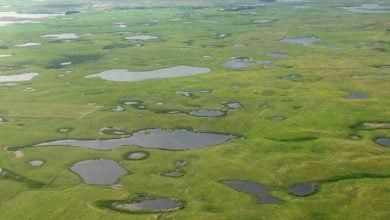The latest international conference on climate change concluded in Accra, Ghana on August 27. The meeting was the third round this year in the United Nations talks, which is working to develop a treaty to replace the 1997 Kyoto Protocol. The Kyoto agreement introduced very modest limitations on greenhouse gas emissions. Despite the limited nature of the emissions controls, the U.S. government refused to sign the agreement.
|
A major issue that emerged at the conference focused on the role forests play in reducing carbon emissions. Deforestation is estimated to contribute to 20 percent of global warming. Forests “contain” carbon dioxide since trees and plants remove it from the atmosphere through their natural physiological processes. So, protecting forests is understood to be an important way to fight global warming.
Conflict over forest protection
How humanity will act to slow global warming comes down to an issue of money. Any solutions that impinge on capitalist competition are either blocked or diluted by the United States and other imperialist representatives at meetings like the one in Accra.
To the satisfaction of the transnational corporations, a carbon market, or “cap-and-trade,” market-based mechanism for carbon emission control is currently in use. Under this system, countries or companies are allotted a certain amount of emissions. Companies that do not use their full amount of emissions are allowed to sell their “excess” emission credits on the market, allowing someone else to pollute more. Polluters can also buy carbon credits through offsets: investments in carbon-reducing technology or development in some other part of the world.
At present, forest protection is not a part of existing carbon markets. Proponents argue that including forests in cap-and-trade schemes will give nations an economic incentive to protect their forests. Opponents point out that including forests in the carbon market will have negative consequences for the people who most depend on forests for their livelihoods, while failing to address the root causes of deforestation and more broadly, of global warming.
Kate Horner, of the group Friends of the Earth, attended the Accra conference and wrote, “Forest carbon markets would enable Northern countries, like the United States and Europe, to avoid the steep emissions reductions obligations needed to avoid dangerous climate change. Developing carbon markets for forests would allow relatively inexpensive carbon credits to flow into carbon trading systems that are supposed to encourage a shift to cleaner energy and production in Northern countries. But this means that polluting industries in the North will likely find it cheaper to purchase ‘credits’ than clean up their acts.”
Potential land grab crisis
Inclusion in the carbon market would increase the value of forests as a commodity. This could potentially lead to a rapid increase in land rights’ abuses.
Belmond Tchoumba, Friends of the Earth International coordinator of the Forest and Biodiversity Programme, said: “If the value of their forests increases, local communities may face governments and corporations willing to go to extreme lengths to wrest their forests away from them. Delegates are focusing primarily on finance but to stop deforestation, land rights must be centre stage. Yet these U.N. climate talks shamefully continue to take place without any meaningful participation by Indigenous Peoples.”
Sixty million indigenous people are dependent on forests for their livelihoods, food and medicines. These people have already been severely impacted by deforestation, in particular to grow crops and bio-fuels for export. Indigenous peoples and other forest-dependent communities often have no formal land title, although they have a vested interest in protecting forests. Many have been forcibly and even violently evicted from their territories.
Fundamental issue: which way to sustainable development
Underlying the forest discussions is the global divide between the industrialized, developed nations which are responsible for the bulk of the carbon emissions causing the current climate change crisis; and the developing nations which are facing the most catastrophic impacts of climate change, while still struggling to achieve sustainable development for their people.
Capitalist development by its very nature places short-term profit as the most important goal, regardless of the long or short-term consequences for the environment. Untrammeled capitalist industrial development has resulted in today’s crisis of climate change. Socialism is a planned economic system. By taking the profit motive out of the picture, a socialist society places priority on human needs and environmental sustainability, laying the basis for truly sustainable development.







